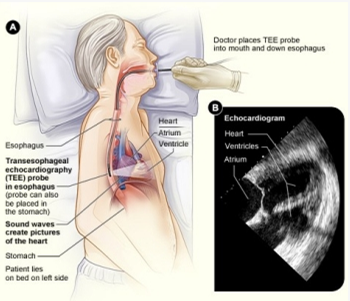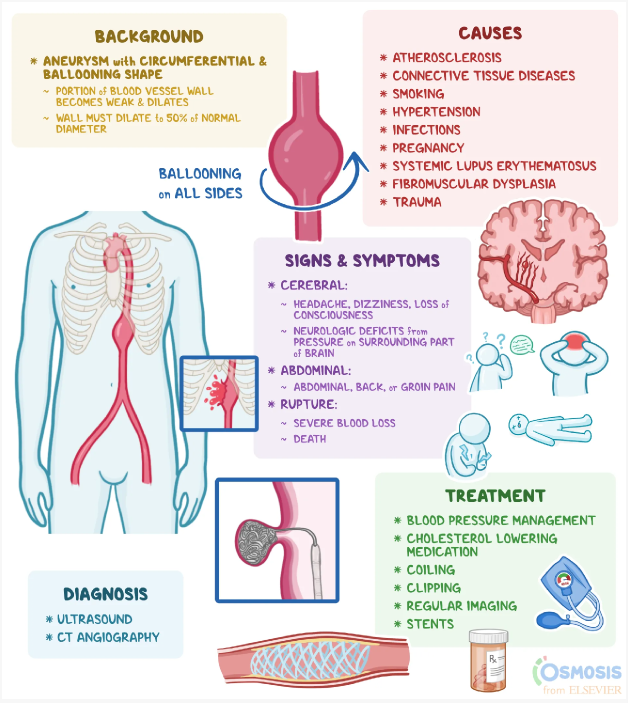A nurse is preparing a client for scheduled transesophageal echocardiography. Which action should the nurse perform?
Instruct the client to drink 1 L of water before the test.
Administer intravenous (IV) benzodiazepines and opioids.
Inform the client that the client will remain on bed rest following the procedure
Inform the client that an access line will be initiated in the femoral artery.
The Correct Answer is D
Transesophageal echocardiography is a diagnostic procedure that involves inserting a probe into the esophagus to obtain detailed images of the heart. In some cases, an access line may be initiated in the femoral artery to monitor blood pressure during the procedure and administer medications if needed. Informing the client about this aspect of the procedure helps ensure that they are aware of what to expect and can provide informed consent.

Let's go through the other options and explain why they are not the most appropriate actions:
Instruct the client to drink 1 L of water before the test: This action is not necessary for transesophageal echocardiography. Drinking water before the test is typically done for certain abdominal or pelvic ultrasound examinations to provide better visualization. However, for TEE, the probe is inserted into the esophagus, and drinking water is not required.
Administer intravenous (IV) benzodiazepines and opioids: The administration of intravenous benzodiazepines and opioids is not a routine part of preparing a client for TEE. The need for sedation or analgesia during the procedure would be determined based on the individual client's condition and level of discomfort.
Inform the client that the client will remain on bed rest following the procedure: While some post-procedure instructions may be given to the client, such as avoiding eating or drinking until the effects of sedation wear off, informing the client that they will remain on bed rest following the procedure is not a specific requirement for TEE. Post-procedure instructions can vary depending on the individual client's condition and the healthcare provider's recommendations.
Nursing Test Bank
Naxlex Comprehensive Predictor Exams
Related Questions
Correct Answer is A
Explanation
Elevated levels of LDL (low-density lipoprotein) cholesterol are associated with an increased risk of coronary artery disease (CAD). LDL cholesterol is often referred to as "bad" cholesterol because it can contribute to the formation of plaque in the arteries, leading to narrowing and blockage of the arteries supplying the heart. This increases the risk of developing CAD and related complications such as heart attack and stroke.
On the other hand, HDL (high-density lipoprotein) cholesterol is often referred to as "good" cholesterol. HDL cholesterol helps remove excess cholesterol from the bloodstream and transport it back to the liver for processing and excretion. Higher levels of HDL cholesterol are associated with a decreased risk of CAD because it helps to prevent the accumulation of cholesterol on artery walls.
Therefore, understanding that increased LDL and decreased HDL levels increase the risk of coronary artery disease demonstrates a good understanding of the significance of cholesterol levels and their impact on cardiovascular health.
Correct Answer is B
Explanation
Abdominal aortic aneurysms (AAA) often do not present with specific symptoms in the early stages. It is not uncommon for individuals with AAA to be asymptomatic or have vague symptoms. Therefore, the absence of abdominal pain or any problems related to the abdomen is a common finding during the assessment of a client with an abdominal aortic aneurysm.
Let's briefly review the other statements:
"I have stomach pain every time I eat a big, heavy meal": This statement is more suggestive of gastrointestinal issues such as indigestion or acid reflux rather than specifically related to an abdominal aortic aneurysm.
"I have periodic episodes of constipation and then diarrhea": This statement may indicate gastrointestinal issues, but it is not a typical symptom associated with an abdominal aortic aneurysm. AAA is primarily related to the aorta, the main blood vessel in the abdomen, and its symptoms are not directly linked to bowel function.
"I belch a lot, especially when I lay down after eating": This statement suggests gastrointestinal symptoms such as acid reflux or gastroesophageal reflux disease (GERD). While these symptoms may be unrelated to the abdominal aortic aneurysm itself, they can coexist with other conditions.

Whether you are a student looking to ace your exams or a practicing nurse seeking to enhance your expertise , our nursing education contents will empower you with the confidence and competence to make a difference in the lives of patients and become a respected leader in the healthcare field.
Visit Naxlex, invest in your future and unlock endless possibilities with our unparalleled nursing education contents today
Report Wrong Answer on the Current Question
Do you disagree with the answer? If yes, what is your expected answer? Explain.
Kindly be descriptive with the issue you are facing.
